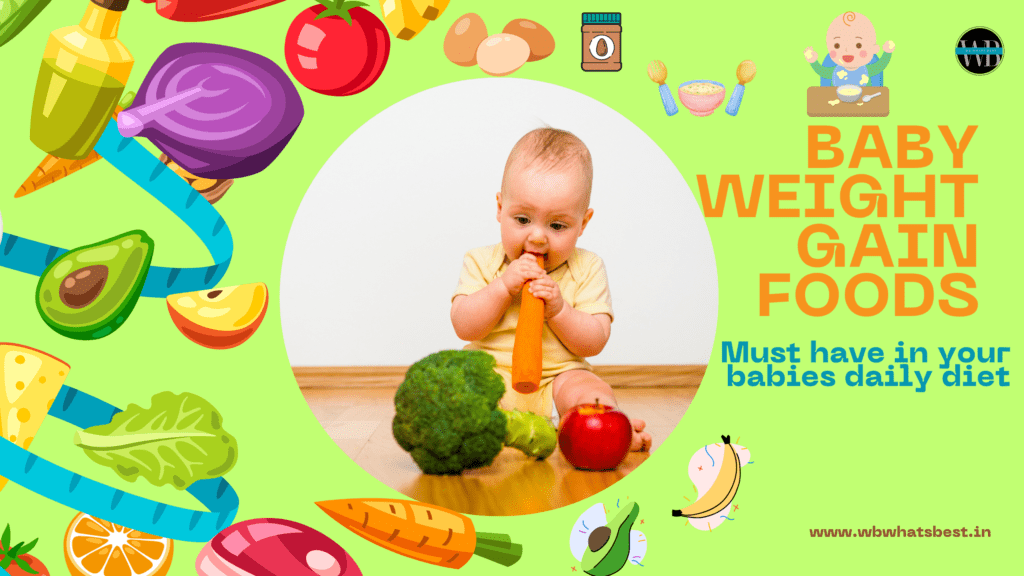Ensuring your baby’s healthy growth and development is essential, and understanding the best baby weight gain foods plays a crucial role. Babies experience rapid growth, especially in their first year, and proper nutrition is vital. In this guide, we will explore the top foods that can promote healthy weight gain in infants, ensuring they receive the nutrients they need.

Understanding Baby Weight Gain
Contents
- 1 Understanding Baby Weight Gain
- 1.1 Indicators of Healthy Weight Gain in Infants
- 1.2 Key Nutrients for Baby Weight Gain foods
- 1.3 Best Baby Weight Gain foods for healthy baby
- 1.4 Tips for Encouraging Healthy Eating Habits
- 1.5 When to Consult a Pediatrician
- 1.6 Conclusion
- 1.7 1. How to gain newborn baby weight?
- 1.8 2.How to make baby gain weight fast while breastfeeding?
- 1.9 3. Baby weight gain syrup?
A baby’s weight gain is an important indicator of their overall health. In the first few months, infants usually double their birth weight by around five months and triple it by their first birthday. Hence, providing nutrient-dense foods is essential to support this development. You can plan your babys diet using nutrition trackers.
Indicators of Healthy Weight Gain in Infants
Before we look at specific foods, it’s important to recognize the signs of healthy weight gain:
- Steady growth in weight and height as shown on growth charts.
- Consistent feeding patterns—babies typically feed every two to three hours.
- Adequate hydration, reflected in a sufficient number of wet diapers daily.
- A cheerful demeanor—healthy babies are usually active and content.
Key Nutrients for Baby Weight Gain foods
When choosing foods to encourage weight gain, it’s important to select options that are nutrient-rich instead of merely calorie-dense. Here are the crucial nutrients to consider:
- Proteins: Necessary for growth and development.
- Fats: Essential for brain development; focus on healthy fats.
- Carbohydrates: Provide energy for daily activities.
- Vitamins and Minerals: Support overall health and development.
Best Baby Weight Gain foods for healthy baby
1. Breast Milk and Formula
Breast milk is often referred to as nature’s perfect food, full of essential nutrients and antibodies. For those who are not breastfeeding, iron-fortified formula is an excellent alternative. Both options are tailored to support optimal growth. Listing below few most recommended formula milk for babies
Aptamil Gold Infant Formula Milk Powder for Babies
NAN PRO Stage 1 Infant Formula Milk Powder for babies
2. Avocado
Avocados are a nutrient-dense choice, rich in healthy fats and calories. Their creamy texture makes them easy for babies to eat. You can serve them mashed or mix them with other foods like banana for a tasty combination. Avocados are a fantastic option for babies because they are rich in healthy monounsaturated fats, which promote brain development and overall growth. Incorporating avocados into your baby’s diet can contribute to both their development and weight management.
3. Bananas
Bananas are a fantastic source of potassium and carbohydrates, providing energy and aiding weight gain due to their higher calorie content. They can be served mashed, blended in smoothies, or offered as finger food for older infants.
4. Full-Fat Dairy Products
Once your baby is ready for solid foods, introducing full-fat yogurt and cheese can be beneficial. These dairy items are high in calcium and fat, both important for bone health and weight gain. Opt for varieties without added sugars or artificial flavors.
5. Nut Butters
After your baby has started solids and has no allergies, nut butters such as almond or peanut butter can be excellent for weight gain. They are rich in healthy fats and proteins. You can spread a thin layer on whole-grain bread or mix them into oatmeal. Always be mindful in selecting nut butters for babies after checking ingredients, for your convenience we have listed down few
Jus’ Amazin Lil Stars Almond Butter With Jaggery
Jus’ Amazin Crunchy Almond Butter – Unsweetened
Timios Almond Peanut Butter|Sweetended Honey
Jus’ Amazin Lil Stars Peanut Butter with Jaggery
The Whole Truth – Peanut Butter With Dates (Sweetened)
The Whole Truth – Unsweetened Peanut Butter
6. Oatmeal
Oatmeal is a great source of carbohydrates and fiber, providing energy and keeping your baby satisfied. Cook it with breast milk or formula for added nutrition, and consider mixing in fruits or nut butter for extra flavor. Given below some option of oats and oatmix that can be given to babies
Slurrp Farm Porridge, Millet And Oats Powder
Yogabar Yogababy Saffron & Oats Mix, Healthy Porridge Mix
HEALTHY PANDA-Oats & Nuts Cereal mix- Baby food
7. Sweet Potatoes
Sweet potatoes are loaded with vitamins A and C and offer a good amount of carbohydrates for energy. They can be baked, mashed, or pureed to create a delicious meal for your little one.
8. Eggs
Eggs are an excellent source of high-quality protein and healthy fats. They can be scrambled or hard-boiled and introduced around six months of age. They are versatile and can be incorporated into various meals. There is no doubt that eggs are a powerhouse food and great option when considering baby weight gain foods.
9. Quinoa
Quinoa is a complete protein, containing all nine essential amino acids, making it a great choice for vegetarian families. It is also high in fiber and can be cooked and mashed or added to purees. it supports growth and is a super baby weight gain food too.
10. Meat and Fish
As your baby grows, including lean meats and fish can provide essential iron and omega-3 fatty acids. Options like chicken, turkey, and fatty fish such as salmon are excellent choices. These can be finely minced or pureed for younger infants.
11. Carrots
Carrots are a nutritious food for babies, packed with essential vitamins and minerals. They are an excellent source of beta-carotene, which the body converts into vitamin A, crucial for vision, immune function, and skin health. Carrots are also rich in fiber, which aids digestion and helps maintain a healthy gut. Their naturally sweet flavor and crunchy texture make them appealing to little ones, whether served pureed or as soft-cooked sticks. Additionally, the fiber content can help promote a feeling of fullness, supporting healthy weight gain as part of a balanced diet. Including carrots in your baby’s meals is a tasty way to enhance nutrition and encourage healthy eating habits.
12. Ragi
Ragi, or finger millet, is an excellent choice for babies due to its impressive nutritional profile. Packed with calcium, iron, and protein, it plays a vital role in bone health and overall growth. The high fiber content in ragi aids digestion and supports a healthy gut, which is essential for infants. Additionally, it is gluten-free, making it suitable for those with gluten sensitivities. With its naturally nutty taste, ragi can be easily added to various recipes, such as porridge or mixed with fruits, offering a nutritious and calorie-rich option that can help promote healthy weight gain. Incorporating ragi into your baby’s diet is a great way to enhance their nutrition and support their development.
13. Brocolli
Broccoli is a fantastic vegetable for babies, offering a wealth of nutrients in a small package. Rich in vitamins C and K, it supports immune health and promotes strong bones. Broccoli is also a good source of fiber, which aids digestion and helps maintain a healthy gut. Its antioxidants can contribute to overall wellness, making it a great addition to your baby’s diet. The mild flavor and tender texture, especially when steamed, make it easy for little ones to enjoy. Including broccoli in meals not only provides essential nutrients but can also support healthy weight gain, It is the one of the best baby weight gain foods
Tips for Encouraging Healthy Eating Habits
To support healthy weight gain, consider these tips:
- Offer Variety: Introduce a diverse range of foods to ensure balanced nutrition.
- Avoid Added Sugars and Salt: These can promote unhealthy eating habits and lack essential nutrients.
- Create a Routine: Establish regular meal and snack times to encourage appetite.
- Make Mealtime Enjoyable: Use colorful foods and various textures to engage your baby’s interest in eating.
When to Consult a Pediatrician
While most babies thrive on a nutrient-rich diet, it’s crucial to seek advice from a pediatrician if you notice:
- Slow or Stunted Growth: If your baby isn’t gaining weight as expected, it may indicate an issue.
- Persistent Fussiness or Feeding Aversion: These could signal food allergies or other health concerns.
- Signs of Dehydration: Always ensure your baby stays well-hydrated.
Conclusion
Providing your baby with the right foods for weight gain is essential for their growth and development. By incorporating a variety of nutrient-dense options into their diet, you can help them achieve a healthy weight while ensuring they get all the necessary nutrients. Always consult your pediatrician for personalized advice and recommendations.
1. How to gain newborn baby weight?
To help a newborn gain weight, it’s essential to feed them frequently, offering breast milk or formula every 2-3 hours, even if they don’t show signs of hunger. Ensuring a proper latch during breastfeeding is crucial, as it maximizes milk intake. Encourage longer feeding sessions and consider pumping to maintain milk supply. For breastfeeding mothers, a well-balanced diet rich in healthy fats and proteins can provide the necessary calories. Regular pediatric check-ups are important to monitor growth and address any concerns. Additionally, skin-to-skin contact can enhance bonding and stimulate feeding, while limiting pacifier use can help ensure more feeding opportunities. Always consult a pediatrician for tailored advice and to rule out any health issues.
2.How to make baby gain weight fast while breastfeeding?
To help a breastfeeding baby gain weight quickly, focus on increasing the frequency and duration of feedings. Offer breast milk every 2-3 hours, even if the baby isn’t showing hunger cues. Ensure a proper latch to facilitate effective feeding and maximize milk intake. Consider feeding in a calm environment to help the baby focus on feeding. Additionally, breastfeeding mothers should maintain a balanced diet rich in healthy fats, proteins, and calories to enhance milk quality. Skin-to-skin contact can also promote feeding efficiency. If weight gain remains a concern, consult with a pediatrician for tailored guidance and support.
3. Baby weight gain syrup?
Baby weight gain syrup typically refers to nutritional supplements designed to help infants and toddlers gain weight. These syrups often contain a mix of vitamins, minerals, and additional calories to support healthy growth. However, it’s essential to consult a pediatrician before using any weight gain syrup, as they can recommend appropriate products based on your baby’s specific needs. They may also suggest dietary adjustments or other strategies to encourage healthy weight gain without relying solely on supplements.
